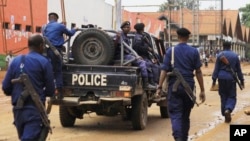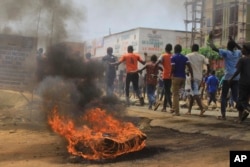As the Democratic Republic of Congo hurtles toward contentious, repeatedly delayed elections Sunday, observers say they're worried about chaos and violence surrounding the polls.
Congo analyst Stephanie Wolters of the Institute for Security Studies says she is less concerned about the result of the poll than about the dangerous environment that more than 40 million voters may face.
"We are getting reports about how poorly organized the CENI (electoral commission) is," she said. "The voting material hasn't been properly distributed; we're hearing that potentially, instead of counting ballots, the independent electoral commission will transmit the final results by internet. And we're just very concerned about the technical legitimacy of this, about the potential for chaos, and the potential for violence."
The poll was originally set for 2016, but officials delayed it repeatedly, allowing longtime President Joseph Kabila to stay in office two years past the end of his term.
This year, authorities maintained that the poll would happen December 23 — until a warehouse full of electoral materials mysteriously burned to the ground and officials announced another one-week delay.
On Dec. 24, officials announced they also would postpone voting in three volatile areas which happen to be bastions of opposition support. The announcement led to violent protests Thursday in the city of Beni.
Many observers, like Claude Kabemba, the Johannesburg-based director of Southern Africa Resource Watch, say they are not optimistic.
Although the latest opinion poll has shown opposition candidate Martin Fayulu with a commanding lead, Kabemba is betting that Kabila himself — not Kabila's chosen successor, Emmanuel Ramazani Shadary — will ultimately win.
"We are heading toward a crisis, we are heading toward chaos, we are heading toward President Joseph Kabila remaining in power because that is the strategy, that is the idea, that is the purpose of the entire maneuvering that has been done, is for him to showcase to the world that, 'We have been willing to go to elections, I've organized elections, the Congolese put money, put up an independent electoral commission — but, this has happened, this has happened, this has happened,'" Kabemba said.
Congo is funding the election, after refusing international assistance. And Thursday, the government announced it would expel the ambassador from the European Union after the EU renewed sanctions against several Congolese officials, including Shadary.
VOA sought comment from the Congolese government on the expulsion and on the pre-election atmosphere, but the government's top spokesman did not answer repeated calls.
Wolters says she expects Shadary to triumph.
"I think we have many reasons to believe that the government is going to try and hijack this election and have its incumbent, Ramazani Shadary, win," Wolters said. "I have very few indications at this point that the government wants to hold a free and fair poll in a peaceful environment. So I think it is highly likely that we will see Joseph Kabila's successor being declared as the winner."
In its nearly 60-year history as an independent country, Congo has never experienced a peaceful transfer of power.






